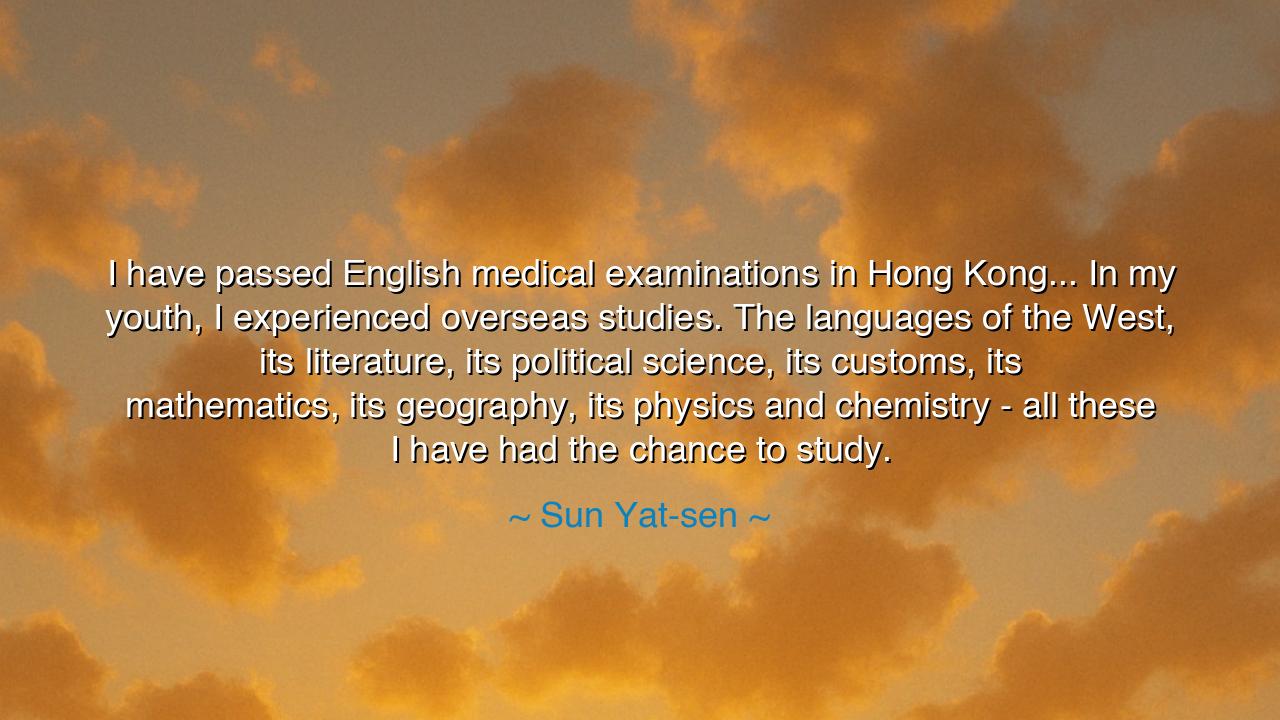
I have passed English medical examinations in Hong Kong... In my
I have passed English medical examinations in Hong Kong... In my youth, I experienced overseas studies. The languages of the West, its literature, its political science, its customs, its mathematics, its geography, its physics and chemistry - all these I have had the chance to study.






In the profound words of Sun Yat-sen, “I have passed English medical examinations in Hong Kong... In my youth, I experienced overseas studies. The languages of the West, its literature, its political science, its customs, its mathematics, its geography, its physics and chemistry — all these I have had the chance to study,” we glimpse not a mere recollection of education, but the portrait of a mind awakening to the world. His words breathe with both gratitude and purpose — the voice of a man who stood between two civilizations and sought to bridge them, not for his own gain, but for the rebirth of his nation. In this reflection, Sun does not boast of scholarship; he speaks of preparation, of learning as a sacred duty in service of humanity’s greater cause.
The origin of this quote lies in the crucible of late 19th-century China — a land wounded by colonial humiliation, yet still pulsing with ancient pride. At that time, the East and West stood as two worlds apart: one steeped in tradition, the other racing ahead through science and industry. Sun Yat-sen, born in the small village of Cuiheng, was among the first of his generation to cross that chasm. His studies in medicine and Western thought were not acts of imitation, but of transformation. He saw knowledge not as belonging to any one people, but as a river that could nourish all lands. By mastering both Eastern wisdom and Western science, Sun prepared himself to become what few men in history achieve — a bridge between ages, the herald of a new dawn.
To the ancients, education was never about accumulation but about cultivation — the refinement of one’s soul until it could serve others. In the same way, Sun’s mastery of Western disciplines was not a flight from Chinese tradition, but its continuation in a broader horizon. Confucius had taught that the purpose of learning was to “rectify the heart and govern the nation.” Sun followed this same principle, expanding it to the modern age. He saw that to rescue his country from decline, he needed not only the moral strength of the sages but also the scientific knowledge of the moderns. Thus, his studies in physics, chemistry, and politics became the tools of a spiritual mission — to heal not only bodies as a physician but the body of the nation itself.
Consider how Peter the Great of Russia once traveled in disguise across Europe, learning the arts of shipbuilding, engineering, and governance to bring his country into a new era. Like Peter, Sun Yat-sen sought renewal through knowledge. But unlike the czar, Sun’s revolution was not born from the throne but from the heart of the people. His education, wide and worldly, became the soil from which grew the Three Principles of the People — nationalism, democracy, and livelihood — ideals that combined Western political theory with Eastern virtue. His life became proof that education, when guided by purpose, is not an ornament but a weapon for justice and renewal.
There is humility and fire interwoven in his tone. When Sun recounts the breadth of his studies, he speaks not as a scholar detached from life, but as a warrior who has sharpened his blade on many stones. His words echo an ancient truth: that wisdom comes not from isolation, but from synthesis. He understood that a nation that refuses to learn from others condemns itself to stagnation. Thus, while many of his contemporaries feared the West as a corrupter of culture, Sun embraced its knowledge while preserving his people’s soul. He saw no contradiction between modern science and moral virtue, between the microscope and the heart of Heaven.
In this, his message to future generations becomes clear: seek learning from all corners of the earth, but never lose the center of your spirit. The wise man is not one who rejects foreign influence, nor one who forgets his roots, but one who fuses them into something greater. The greatness of Sun Yat-sen lies not in that he studied widely, but that he turned his learning into liberation — education made living, thought made action. His legacy teaches that to reform the world, one must first reform the mind, and that the true scholar’s duty is not to hoard knowledge, but to translate it into service.
And so, let his words be a torch for all who hear them: Learn broadly. Think deeply. Serve nobly. Do not let the boundaries of culture, language, or tradition confine your understanding. Like Sun Yat-sen, gather wisdom from every field, and then return it to your people as light. For knowledge without compassion is hollow, and compassion without knowledge is blind. The future belongs to those who, like him, study not for themselves, but for the awakening of nations and the healing of mankind.






AAdministratorAdministrator
Welcome, honored guests. Please leave a comment, we will respond soon